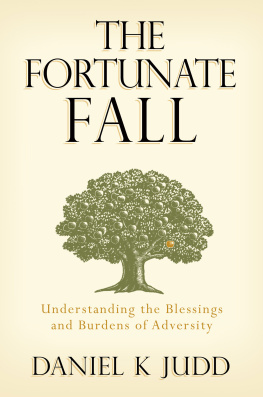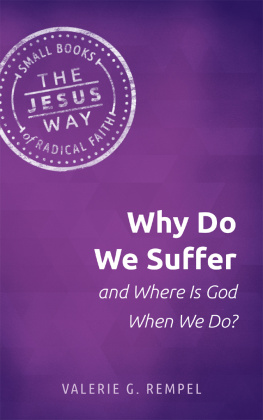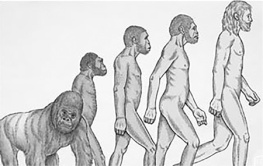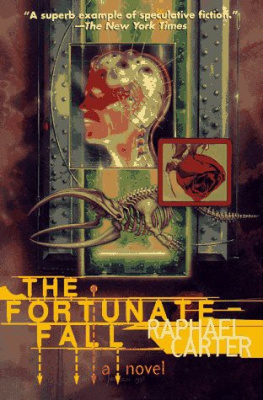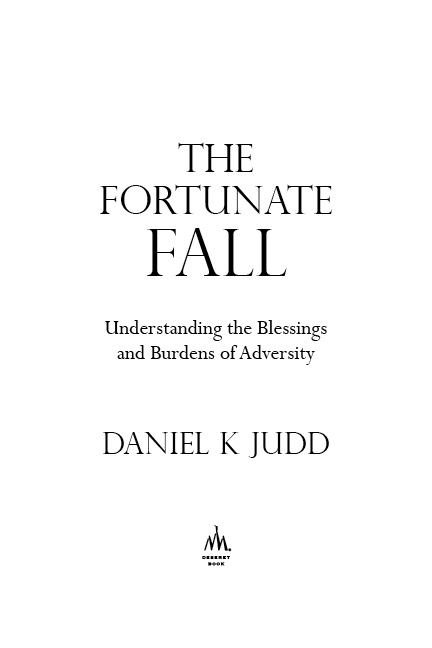2011 Daniel K. Judd.
All rights reserved. No part of this book may be reproduced in any form or by any means without permission in writing from the publisher, Deseret Book Company, P.O. Box 30178, Salt Lake City Utah 30178. This work is not an official publication of The Church of Jesus Christ of Latter-day Saints. The views expressed herein are the responsibility of the author and do not necessarily represent the position of the Church or of Deseret Book. Deseret Book is a registered trademark of Deseret Book Company.
Library of Congress Cataloging-in-Publication Data
Judd, Daniel K
The fortunate Fall : understanding the blessings and burdens of adversity / Daniel K Judd.
p. cm.
Includes bibliographical references and index.
ISBN 978-1-60641-843-7 (hardbound : alk. paper)
1. SufferingReligious aspectsThe Church of Jesus Christ of Latter-day Saints. 2. Fall of man. 3. The Church of Jesus Christ of Latter-day SaintsDoctrines. 4. Mormon ChurchDoctrines. I. Title.
BX8643.S93J83 2011
233'.14dc22 2010044116
Printed in the United States of America
Publishers Printing, Salt Lake City, UT
10 9 8 7 6 5 4 3 2 1
To my children and the generations to follow:
Adversity and affliction are often a medicine or a blessing in disguise, provided you allow the Lord to consecrate them for your gain
Acknowledgments
My introduction to what I eventually came to understand as the doctrine of the fortunate fall came many years ago when I was a discouraged young man lying in a hospital bed. Someone shared a poem with me that included the words, Success is failure turned inside out. I do not remember who gave me that poem, but I still recall the comfort and curiosity those words brought to my heart and mind. Thank you.
I also thank those who have made this book possible. I am particularly grateful to my friends and associates at Deseret Book. Cory Maxwell and Sheri Dew have provided constant encouragement. Suzanne Brady has been a thoughtful and wise editor, Shauna Gibby designed the book, and Rachael Ward typeset it.
My colleagues at Brigham Young University have been great friends and able associates. I would particularly like to thank Professors Robert L. Millet and Dennis L. Largey. Thanks as well to the faculty and staff of the Religious Study Center at Brigham Young University; to my research assistants, Andrew R. Goddard and Jennifer Manwaring Martin; and to each of my former students.
I am grateful to my wonderful wife, Kaye, and to our faithful and competent children: Jake, Jessi, Rachel, and Adam. Thank you for sharing your lives with me.
Finally, I acknowledge the beauty and power of the restored gospel of Jesus Christ. How very grateful I am for the existence and teachings of latter-day prophets and the goodness and graciousness of God our Eternal Father and of the Lord Jesus Christ.
Prologue
Several years ago a nationwide survey included the following question: If you could ask God only one question and you knew he would give you an answer, what would you ask? The most common response given by those being surveyed was Why is there pain and suffering in the world? Many of us ask related questions concerning Gods response to suffering and sorrow as we attempt to understand adversity and affliction in our own lives and in the lives of others. Even Jesus Christ, the Savior of the world, cried, My God, my God, why hast thou forsaken me? (Matthew 27:46) as He suffered the collective burdens of all humankind. The Savior, like so many who suffer, was acknowledging what appeared to be His Fathers absence during the most difficult moments of His mortal ministry. In our own dispensation the Prophet Joseph Smith pleaded, O God, where art thou? (D&C 121:1) as he languished in Liberty Jail and prayed for the safety of his family and for the welfare of thousands of other Latter-day Saints who were suffering at the hands of those who opposed them.
Members of The Church of Jesus Christ of Latter-day Saints are generally a happy, healthy, and hopeful people, but we too face adversity and afflictionas Church members, citizens of nations and communities, and especially as families and individuals. Each one of us, at various times and in different ways, is faced with experiences that stretch us to what we feel is beyond our capacity to endure. One Latter-day Saint described her experiences with sorrow and suffering in her provocatively titled book If the Gospel Is True, Why Do I Hurt So Much? Members of other faiths have asked similar questions and attempted to provide meaningful answers in publications. For example, in Mans Search for Meaning, author Viktor E. Frankl, a Jewish psychiatrist, described his own experiences and those of others as prisoners in the Nazi concentration camps of World War II. Other examples include Rabbi Harold Kushners book When Bad Things Happen to Good People and noted Evangelical writer Philip Yanceys book Where Is God When It Hurts? These books, like thousands of similar publications, attempt to answer why a loving God allows His children to experience adversity, affliction, and even evil.
The perspective found in this volume, The Fortunate Fall, includes many principles of truth Latter-day Saints share with those of other faiths, but it is based on the distinctive doctrines of the gospel of Jesus Christ restored to the earth through the Prophet Joseph Smith. As the title suggests, this book focuses on the Latter-day Saint doctrine of the fall of Adam and Eve, for if we truly understand the Fall, we can better understand the sorrow and suffering that exist in our lives and in the lives of others. Most important, understanding the fall of Adam and Eve helps us to better understand why we need to implement in our lives the ultimate solution to adversity and afflictionthe atonement of Jesus Christ.
President Ezra Taft Benson taught: The plan of redemption must start with the account of the fall of Adam. In the words of Moroni, By Adam came the fall of man. And because of the fall of man came Jesus Christ,... and because of Jesus Christ came the redemption of man (Mormon 9:12). Just as a man does not really desire food until he is hungry, so he does not desire the salvation of Christ until he knows why he needs Christ. No one adequately and properly knows why he needs Christ until he understands and accepts the doctrine of the Fall and its effect upon all mankind.
Plain and Precious Doctrines
A fundamental teaching of the Church is that many of the plain and most precious parts of the gospel (1 Nephi 13:32) were lost to the earth in the years following the deaths of Jesus Christ and the early Apostles. Among these precious doctrines was the understanding that the fall of Adam and Eve was a vital part of Gods plan for the salvation of His children. The Fortunate Fall illustrates how this precious doctrine, once understood as a blessing, came to be misunderstood, distorted, and then transformed into what is now understood by most of the religious world as a great evil. This doctrinal distortion has been a major source of confusion as individuals and religions have attempted to understand sorrow, suffering, and the existence of evil. The Book of Mormon prophet Nephi recorded, Because of these things which are taken away out of the gospel of the Lamb, an exceedingly great many do stumble, yea, insomuch that Satan hath great power over them (1 Nephi 13:29). The Fortunate Fall provides explanations and illustrations of the implications of doctrines being lost and then restored.

